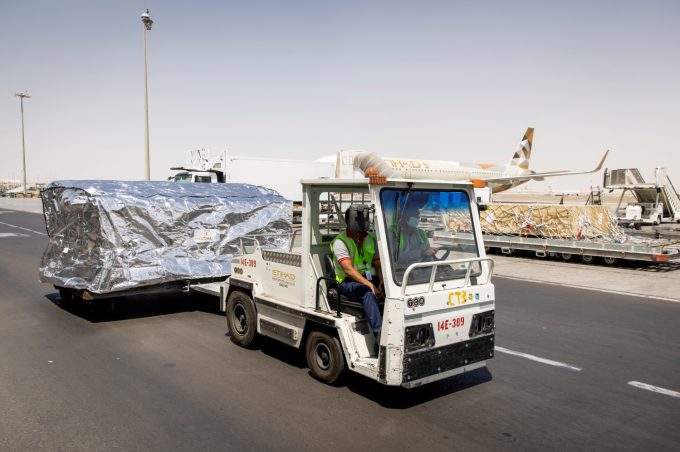Cargo flows through Dubai delayed by flooding, with 300 flights cancelled
Cargo flows out of the Gulf have been upended after two years’ worth of rain ...

Airlines divide into those that pay lip service to cool chain and pharma products – and those that invest properly, according to one pharmaceutical shipper.
IATA’s CEIV programme, said Yulia Ceretaria, head of logistics for Early Health Group, last year, is “a nice piece of paper, but it’s only when companies internally build the right processes that the product is good. Otherwise it’s just a marketing tool.”
One airline that appears to have built up those correct processes is Etihad Cargo, which today announced a 37% rise in pharma volumes last year over 2022, suggesting its investment is paying off.
Fabrice Panza, global head of cool chain for the carrier, explained to The Loadstar in December that the aim was “to do it properly”.
He added: “And if we want to do it properly, we have to be compliant. So we have to go through certification, which implies that within your own organisation, you have the right stakeholders, you make sure that the quality is distilled across the organisation from origin to destination.
“The beauty in being certified is to be talking the same language.”
Mr Panza says standardisation is critical because of the multiple stakeholders involved in pharma shipments – not just the shipper, forwarder and airline, but government, regulators, healthcare authorities, customs, handlers and so on.
“You need to be able to work together smartly; it’s high-value, time- and temperature-sensitive shipments; everyone within the chain has their own responsibility.
“I guess it’s quite natural to have this transparent discussion – the less you hide, the better you become.”
Etihad Cargo’s product is PharmaLife – which boasts a 99.1% compliance rate. In July, the airline opened its next-gen pharma hub, doubling its cool chain storage and handling capacity to more than 50,000 tonnes, triggering an immediate 39% increase in volumes that month, followed by 40% in August and 41% in September.
One potential challenge for Etihad (and its fellow Middle Eastern carriers) is that their flights involve transits and pharma shippers tend to prefer direct flights. About 70% of Etihad’s pharma and perishable flows are in transit, with 25% inbound, and 5% are UAE exports. But despite the lack of direct flights, Mr Panza argued that, in fact, being in the Middle East is “extremely advantageous”.
“We are linking the natural flow between Europe and Asia. Flow number one is Europe to US. Flow number two is Europe to Asia, and we are the natural bridge, the gateway between Europe and Asia. So that makes Abu Dhabi Airport and Etihad Cargo a solid proposition for any customer wanting to ship from Europe to Asia.”
He added that Asia was now producing much more pharma, and India – where Etihad has a strong presence – had seen its pharmaceuticals increasingly approved by authorities, including the US FDA. As a result, Etihad has enhanced its cargo screening for US-bound shipments from various stations, including India, which will result in shorter transit times, reduced handling and repackaging and quick ramp transfer.
Add to that the very high compliance rate for pharma, and direct flights become less important.
Etihad has now also developed more than 1,300 pharma-certified tradelanes, including a pharma corridor to Brussels, which it credits as a “major contributing factor” to its growth in the sector. (It has the same to Amsterdam, for its fresh products.).
The other potential fly in airfreight’s ointment is the increasingly good refrigerated services offered by the shipping lines. While air freight’s share of the pharma business is higher than its 1% to 2% share of total cargo volumes, it would only take small jumps by shipping lines to eat into that business.
But Mr Panza says air’s USP of speed and reliability remains critical to shippers.
“I don’t see a massive shift. On the contrary, air cargo, specifically for pharma and fresh, will always be used. There’s no doubt about that. Is ocean trying to evolve? Certainly.
“Intermodality or cross-modality is definitely being studied but does it exist for pharma and fresh? So far, I don’t think so.”
Etihad Cargo has clearly invested significant amounts into its cool chain product lines – but was it worth it? Are the margins there?
Mr Panza said: “It all depends on the value of the goods you are shipping. There used to be rule that you would spend up to 10% of the commercial value of the shipment on the logistics, which is roughly true.” And, of course, pharma tends to be high-value.
Airlines are keeping a far closer eye on high-margin products than before.
“There is a trend towards more pharma and fresh volumes – so yes, we will definitely have more in future.”
And with three consecutive years of growth and record volumes in 2023, it looks like Etihad Cargo is riding that trend nicely.
Comment on this article